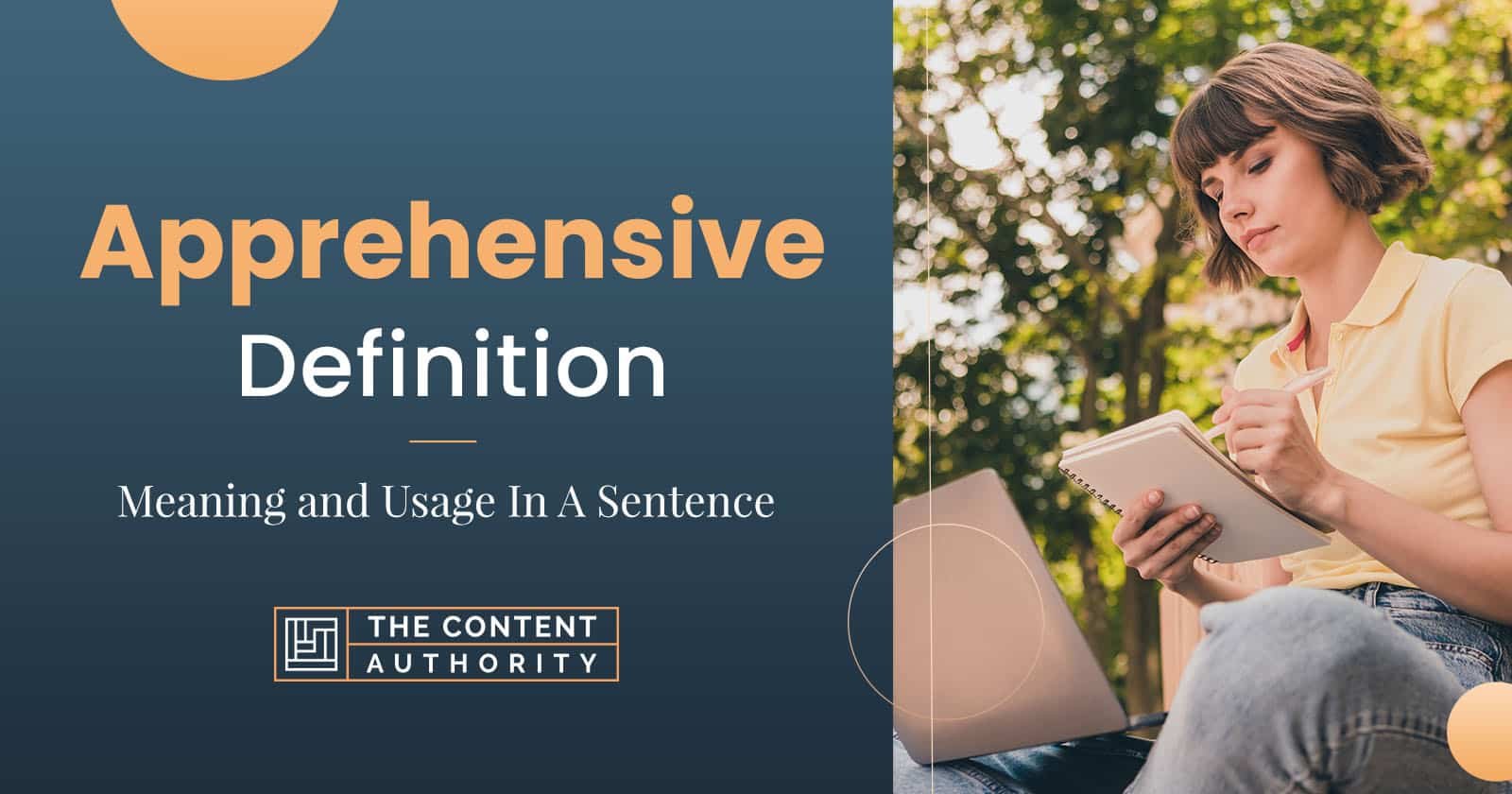You know that feeling when you’re unsure about something or someone, causing you to be anxious or jittery about them? Well, we refer to such a feeling as “apprehensive,” but there’s more to this word than you probably know. We’re here to tell you about apprehensive definitions and how best to use the word when talking or writing.
“Apprehensive” is defined as fear or alarm over potential harm or uncertainty. When used in sentences, the word describes a person who expresses anxiety or fear over something they foresee as dangerous. Such people tend to be cautious or avoid doing certain things to keep themselves safe.
Pretty simple, right? However, learning more about the word’s various definitions, synonyms, antonyms, and how it has been used over time will help you understand it more. Are you ready to learn everything about this word? Let’s get into it.

What Is The Definition of Apprehensive?
“Apprehensive” can also be defined as being anxious or uneasy about the future. It’s the feeling you get when you feel upset or worried that something terrible might happen. It can also be defined as waiting on something with fear or anxiety.
A great example of being apprehensive is when somebody has an instinct that something terrible will happen, making them very worried or cautious about the future. We can also refer to someone as apprehensive when they don’t want to do something because they feel unsafe doing so. An apprehensive person is always on alert and very cautious before engaging in any activity.
Example sentences:
- The history of a few people recovering from the surgical procedure made her apprehensive about the surgery.
- The front office was apprehensive about pairing Russel Westbrook with LeBron James; you can guess the reason for that by looking at the past 50 games.
- The couple was apprehensive about buying a house outside their budget, but it was worth it in the end.
Synonyms and Antonyms of Apprehensive
One of the best ways of familiarizing yourself with a word is to learn its synonyms and antonyms. At times the word “apprehensive” may not be the best fit in your sentences, and that means you will require a similar or opposite word to get the point across. Here are some synonyms and antonyms of the word apprehensive that you can use.
Synonyms
- Anxious (adjective): Feeling uneasy or nervous about an upcoming event.
- Jittery (adjective): Refers to a nervous person who has difficulty relaxing.
- Suspicious (adjective): Having or expressing mistrust of someone.
- Uneasy (adjective): Being troubled, Flustered, unsettled, or uncomfortable.
- Concerned (adjective): Being worried, anxious, or troubled.
- Doubtful (adjective): Feeling uncertain about something or someone.
- Trepidation (noun): Feeling fear or anxiety.
Antonyms
- Calm (adjective): Pleasantly free of worry or nervousness.
- At ease (phrase): Meaning devoid of anxiousness or awkwardness.
- Certain (adjective): The state of being sure or firmly relied upon.
- Collected: (adjective) Being calm, relaxed, and self-controlled.
- Laid-back (adjective) Being free of worry and easygoing.
What Is The Meaning of Apprehensive?
The term apprehensive also has other meanings besides the feeling of worry about something that will happen, or you’re going to do. The word also refers to someone quick to understand. It’s also used when it comes to perceiving or understanding something.
Have a look at some more sentences with the word apprehensive:
- My neighbors feel apprehensive about crossing the street because it has no stop sign.
- My lawyer’s apprehensive nature has helped us out of some tricky situations.
- In some countries, people are apprehensive about walking home late at night.
- The lecturer was apprehensive about giving my classmate a make-up test but gave him one in the end.
Some of the sentences above have shown the different meanings of the word apprehensive. For instance, in the second sentence, the lawyer’s awareness or ability to quickly understand proved helpful in many situations. Without the lawyer’s help, things might have turned worse.
Additional reading: Relentless Definition
Has Apprehensive Changed Its Meaning Overtime?
The word apprehensive did not mean “the feeling of anxiety over the future” as we know it today. The word was initially used to describe the ability of someone to understand something quickly or show great understanding in the 17th century. Another earliest meaning is ‘the act of learning or grasping with the intellect.’
Some of these meanings are still in use today. However, the word apprehensive has morphed over time to the current common meanings. Knowing all the meanings helps you appreciate the word and its evolution.
How to Use Apprehensive in a Sentence?
There are various ways we can use ‘apprehensive’ correctly. For writers, editors, and English students, the word is used as a noun to name a state or as an adjective to describe someone or something. It can also be used as an adverb to describe an action.
It’s easy to know about the usage of “apprehensive” in various contexts with the help of relevant examples. The following three examples show how you can use the word apprehensive as a noun, adjective, or adverb:
- (Noun) Sometimes Tom’s apprehensiveness prevents him from having any fun with his friends.
- (Adjective) I was pretty apprehensive about not riding a bicycle without training wheels when I was young.
- (Adjective) Marsha apprehensively planned the trip and ensured that her parents were well aware of her location.

Is Apprehensive A Negative Word?
The word apprehensive is not negative and does not always signify a bad feeling. It’s what you feel when you’re unsure about something or someone. Being apprehensive will make you more cautious and alert if something terrible happens.
Learn More: Burden Definition – Usage in a Sentence
10 Examples of Apprehensive Usage in a Sentence
We’ve covered ‘apprehensive’ various meanings and applications so far. Next, we’ll look at how the term works in different nouns, adjectives, and adverbs. Here are ten example sentences showing how to use the word apprehensive and its different forms.
- It’s pretty natural for a lady to be apprehensive when expecting a child in her forties.
- China’s apprehensiveness to support the rest of the world’s stand on Russia- Ukraine tension is bad for the country.
- The coach apprehensively added a mark to the squad despite his age.
- Sophie felt apprehensive about being in the country based on its political history.
- Victor felt apprehensive when it came to cutting his beard, but it all worked out for the best in the end.
- Due to her previous negative experiences with babysitters, she has become quite apprehensive about leaving her child with anyone besides the father.
- It takes one house party to make parents apprehensive about leaving you all alone in the house for the weekend.
- The doctor told him not to feel apprehensive about asking many questions regarding the procedure to make him feel better.
- The upcoming exam made Griffin apprehensively study all night.
- Initially, Keanu Reeves was apprehensive about starring in the Matrix movie, but it turned out to be one of his most significant achievements in his career.
How Do You Spell Apprehensive?
The word apprehensive is spelled as /a-p-p-r-e-h-e-n-s-i-v-e /. But according to the International Phonetic Alphabet, the spelling is /aprɪˈhɛnsɪv/
This word is straightforward to spell. However, note that when spelling “apprehensive,” the word has two p characters that follow each other. Many people also omit the ‘e’ at the end of the word because it’s silent. It’s not common to make such mistakes once in a while; however, it’s essential to go through a new word several times to spell it correctly.
How Do You Pronounce “Apprehensive?”
The term apprehensive is pronounced as \ a·pree·hen·suhv\.
Some words have silent letters, and when not keen enough, you can mispronounce them. Learning how to pronounce “apprehensive” comes a long way. Again, note that the word apprehensive has an ‘e’ at the end, which is silent.
How Many Syllables Are In Apprehensive?
“Apprehensive” is a word that has four syllables: app-re-hen-sive.
History & Etymology of Apprehensive
Apprehensive originates from the Medieval Latin word “apprehendere,” which became “apprehensivus,” and from the root word “apprehens,” which means to seize, grasp or take hold.
The word also stems from the French word “apprehensif,” meaning to understand. The Old French also used the parent word appréhender, which means to arrest or seize in the name of the law. However, the term was initially meant to grasp or hold in opinion during the 15th and 16th centuries, but the word continuously morphed into what we are familiar with today.
When Was Apprehensive First Used?
The first recorded use of the word apprehensive with its current meaning was in the 1630s.
Some of the parent words that ‘apprehensive’ stem from, such as apprehender, were in use as early as the 1540s. The Medieval Latin parent word “apprehensivus” was in use from the late 14th century.
Conclusion
Using words such as apprehensive shouldn’t be an issue anymore now that you’ve read this article. However, we advise that you further read about how best to use the word and include it in your speech and writing. Don’t be apprehensive now that you know how to use the term; go out there and confidently use the word.
Further Reading: Premonition Definition – Meaning and Usage in a Sentence
Shawn Manaher is the founder and CEO of The Content Authority. He’s one part content manager, one part writing ninja organizer, and two parts leader of top content creators. You don’t even want to know what he calls pancakes.

